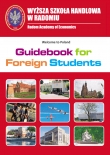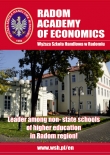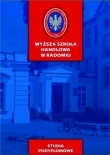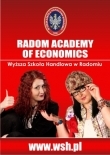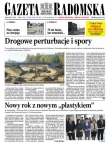 Erasmus Programme
Erasmus Programme
EPS of Radom Academy of Economics
ERASMUS POLICY STATEMENT (EPS) OF RADOM ACADEMY OF ECONOMICS
I part - Strategy, objectives and priorities
Radom Academy of Economics is a non-profit school located in Poland which offers a wide range of courses in economics, humanities and information technology. For the last few years the Academy has actively participated in international exchange programs and cooperation. Since 2004 the implemented international programs: SOCRATES-ERASMUS and Leonardo da Vinci have become the basis of the international cooperation. Research conducted together with partners from abroad and implemented within the framework of bilateral contract constitute a vital part of scientific activity of the Academy.
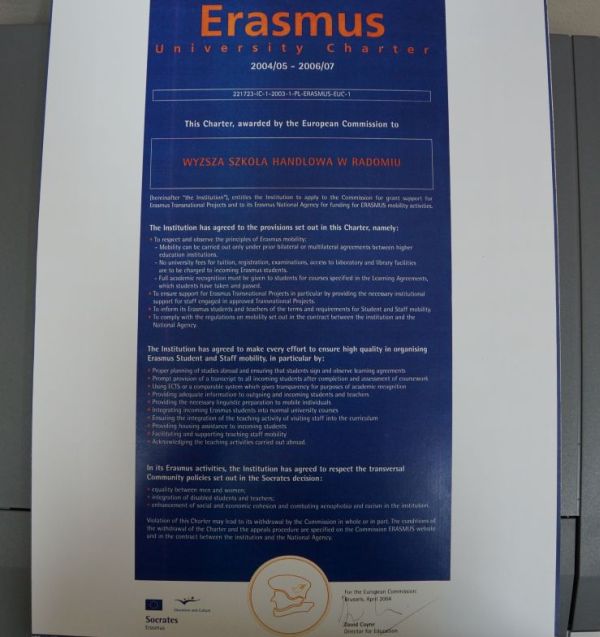
Taking into consideration the guidelines included in the Bologna Declaration, Lisbon Declaration and LLP program we aim at developing the European Union into a society based on an advanced knowledge, a society which is characteristic of the constant economic growth, increase in employment and community cohesion for the next years. Heading for a broader internationalization of education we are thus setting the following priorities:
Radom Academy of Economics will popularise the tenets of the LLP and EPS programs by means of its internet website, articles published in a student magazine „Notabene”, leaflets, meetings with the students and teachers and organization of cyclic cultural events like Erasmus Day or European Days of Culture.

II part - High quality of academic mobility activities
Radom Academy of Economics cares about the high quality of the student and teaching staff exchange. To ensure the highest quality, the following actions are taken:
- Detailed and reliable provision of information about the possibilities and organization of the exchanges
- Establishing unambiguous and equitable selection criteria for the students and teaching staff applying participate in the exchanges
- Linguistic and cultural training for the outgoing students and teaching staff
- Ensuring that the students receive due credit for the study program done at the partner school of higher education on the basis of Learning Agreement and Transcript of Records
- Implementation and the monitoring of ECTS at all faculties and majors
- Ensuring that there would not be any materially significant differences in the study program in relation to the teaching standards at the given major while preparing the Learning Agreement
- Ensure that the DWZ staff and Polish students extend warm hospitality to the students from abroad during their entire stay at the Academy, i.e. help in finding an attractive accommodation, organization of cultural events, integration trips, help in accomplishment of formalities
- Ensuring that didactic activity of the academic teachers abroad is recognized
- Creation of structures and appointing people responsible for administrative service at all levels and accounting for / report on the use of the Community Grant
- Ensuring that the outgoing students retain the students rights in Poland (e.g., payment of domestic scholarships and grants)
- Equal treatment of incoming and domestic students
- Monitoring of the training venues and the conditions ensured by the schools of higher education during the students and teaching staff stay at a given institution.
- Ensuring that proper evaluation of the student exchanges and implementation of the solutions will enable students and teaching staff returning from a partner institution to share their information and experiences with the people who prepare for or are interested in participation in student exchange.
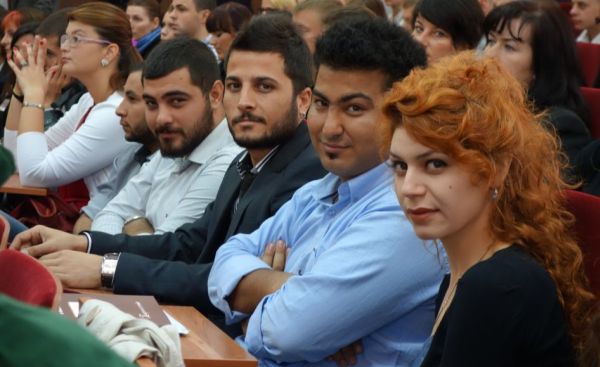 Fot. Erasmus students on Jubilee Inauguration
Fot. Erasmus students on Jubilee Inauguration
III part - Quality of student placement activities
Radom Academy of Economics emphases that the students should possess both theoretical knowledge and practical skills. Therefore, the program of studies is complimented with workshop classes which are supplemented with vocational training. Every student of Radom Academy of Economics is obliged to undertake vocational training. Students have the possibility to do the vocational training (internship) either in the country or abroad (for example, within the Leonardo Da Vinci program). It is an excellent opportunity for the students to acquaint themselves with the realities of partner countries’ economy and the rules regulating the functioning of foreign transactors.
During such training abroad students gain valuable experience which bear fruit in getting a rewarding job in the future. In addition, they improve their language skills and establish connections with people from all over the world.
The venue of the training and the course is directly dependant on the major of the studies the students have chosen. During the training the students cover issues which are previously agreed upon on the basis of individual plan of training.
Students will do their training in established companies. The Academy will bear the responsibility of securing internship positions within such companies on the students’ behalf. The enrolment of the students for the training abroad is based on students’ performance and their language skills. The individual training program is set prior to the commencement of training. The plan has to be in line with the major of the student’s studies and accepted by the Academy Training Coordinator. The Academy also provides the students with adequate cultural and linguistic preparation before the placement. The next step is signing tripartite agreement by the student, the college and the company or institution. The agreement states the obligations and entitlements of either of the party, the method of training evaluation and academic recognition.
During the placement students regularly sends reports on their training to the Training Coordinator of their domestic college or university. The Training Coordinator contacts the Coordinator in the company or institution on a regular basis. Apart from the Training Coordinator the Academy appoints the Training Supervisors who are additionally responsible for training supervision. After finishing training the student has to present the final report together with the positive employer’s opinion. Presentation of these documents is tantamount to credit for compulsory vocational training.
The Academy is planning to create a process of certification involving issuing of proper certificates documenting students’ achievements and the duration of the training. There will be a possibility of combining the academic exchange with the training. The training itself, however, cannot be shorter than 3 months.
ERASMUS POLICY STATEMENT (EPS) OF RADOM ACADEMY OF ECONOMICS
I part - Strategy, objectives and priorities
Radom Academy of Economics is a non-profit school located in Poland which offers a wide range of courses in economics, humanities and information technology. For the last few years the Academy has actively participated in international exchange programs and cooperation. Since 2004 the implemented international programs: SOCRATES-ERASMUS and Leonardo da Vinci have become the basis of the international cooperation. Research conducted together with partners from abroad and implemented within the framework of bilateral contract constitute a vital part of scientific activity of the Academy.

Taking into consideration the guidelines included in the Bologna Declaration, Lisbon Declaration and LLP program we aim at developing the European Union into a society based on an advanced knowledge, a society which is characteristic of the constant economic growth, increase in employment and community cohesion for the next years. Heading for a broader internationalization of education we are thus setting the following priorities:
- annual increase in student and staff exchange.
- striving to balance the international student and teachers exchange from abroad in relation to the national one
- diversity rise and quality upgrade of education of foreign languages among students and staff
- quality upgrade of the services offered to foreign students (i.e. the extension of the catalogue of courses conducted in English, involvement of Polish students in the adaptation processes of foreign students)
- adjusting educational offer to the needs of changing labour market
- consecutive monitoring of the LLC program realization at the Academy for the purpose of making inevitable adjustments as far as the priorities of the program are concerned
- promoting partnership development among different sectors of education (sectors of higher education, vocational education and adult education) and taking action tailored to fit the needs of these sectors
- merge of the foreign student exchange with the vocational training
- cooperation with the companies
- establishing broader and broader cooperation with foreign schools of higher education for the purpose of the mutual realization of multilateral projects and thematic nets based on the transfer of innovation and research projects, mutual creation of the programs of studies and issuing dual diplomas
- creation of uncomplicated and clear administrative procedures at the Academy allowing for the improvement of the student exchange standards in the framework of LLP
- promoting an awareness of the importance of cultural and linguistic diversity, as well as of the need to combat racism, prejudice and xenophobia
- promoting equality between men and women and contributing to combating all forms of discrimination based on sex, racial or ethnic origin, religion or belief, disability, age or sexual orientation
- making provision for disabled students by the actions taken by the spokesperson for disabled students appointed at the academy and by granting them additional scholarships
- aiming at active realization and promotion of the ideas of the following LLP programs: Comenius, Erasmus, Leonardo da Vinci, Grundtvig, Jean Monne
Radom Academy of Economics will popularise the tenets of the LLP and EPS programs by means of its internet website, articles published in a student magazine „Notabene”, leaflets, meetings with the students and teachers and organization of cyclic cultural events like Erasmus Day or European Days of Culture.

II part - High quality of academic mobility activities
Radom Academy of Economics cares about the high quality of the student and teaching staff exchange. To ensure the highest quality, the following actions are taken:
- Detailed and reliable provision of information about the possibilities and organization of the exchanges
- Establishing unambiguous and equitable selection criteria for the students and teaching staff applying participate in the exchanges
- Linguistic and cultural training for the outgoing students and teaching staff
- Ensuring that the students receive due credit for the study program done at the partner school of higher education on the basis of Learning Agreement and Transcript of Records
- Implementation and the monitoring of ECTS at all faculties and majors
- Ensuring that there would not be any materially significant differences in the study program in relation to the teaching standards at the given major while preparing the Learning Agreement
- Ensure that the DWZ staff and Polish students extend warm hospitality to the students from abroad during their entire stay at the Academy, i.e. help in finding an attractive accommodation, organization of cultural events, integration trips, help in accomplishment of formalities
- Ensuring that didactic activity of the academic teachers abroad is recognized
- Creation of structures and appointing people responsible for administrative service at all levels and accounting for / report on the use of the Community Grant
- Ensuring that the outgoing students retain the students rights in Poland (e.g., payment of domestic scholarships and grants)
- Equal treatment of incoming and domestic students
- Monitoring of the training venues and the conditions ensured by the schools of higher education during the students and teaching staff stay at a given institution.
- Ensuring that proper evaluation of the student exchanges and implementation of the solutions will enable students and teaching staff returning from a partner institution to share their information and experiences with the people who prepare for or are interested in participation in student exchange.
 Fot. Erasmus students on Jubilee Inauguration
Fot. Erasmus students on Jubilee InaugurationIII part - Quality of student placement activities
Radom Academy of Economics emphases that the students should possess both theoretical knowledge and practical skills. Therefore, the program of studies is complimented with workshop classes which are supplemented with vocational training. Every student of Radom Academy of Economics is obliged to undertake vocational training. Students have the possibility to do the vocational training (internship) either in the country or abroad (for example, within the Leonardo Da Vinci program). It is an excellent opportunity for the students to acquaint themselves with the realities of partner countries’ economy and the rules regulating the functioning of foreign transactors.
During such training abroad students gain valuable experience which bear fruit in getting a rewarding job in the future. In addition, they improve their language skills and establish connections with people from all over the world.
The venue of the training and the course is directly dependant on the major of the studies the students have chosen. During the training the students cover issues which are previously agreed upon on the basis of individual plan of training.
Students will do their training in established companies. The Academy will bear the responsibility of securing internship positions within such companies on the students’ behalf. The enrolment of the students for the training abroad is based on students’ performance and their language skills. The individual training program is set prior to the commencement of training. The plan has to be in line with the major of the student’s studies and accepted by the Academy Training Coordinator. The Academy also provides the students with adequate cultural and linguistic preparation before the placement. The next step is signing tripartite agreement by the student, the college and the company or institution. The agreement states the obligations and entitlements of either of the party, the method of training evaluation and academic recognition.
During the placement students regularly sends reports on their training to the Training Coordinator of their domestic college or university. The Training Coordinator contacts the Coordinator in the company or institution on a regular basis. Apart from the Training Coordinator the Academy appoints the Training Supervisors who are additionally responsible for training supervision. After finishing training the student has to present the final report together with the positive employer’s opinion. Presentation of these documents is tantamount to credit for compulsory vocational training.
The Academy is planning to create a process of certification involving issuing of proper certificates documenting students’ achievements and the duration of the training. There will be a possibility of combining the academic exchange with the training. The training itself, however, cannot be shorter than 3 months.




